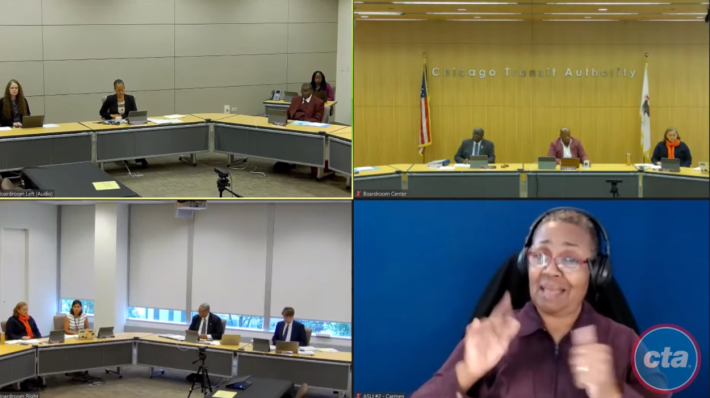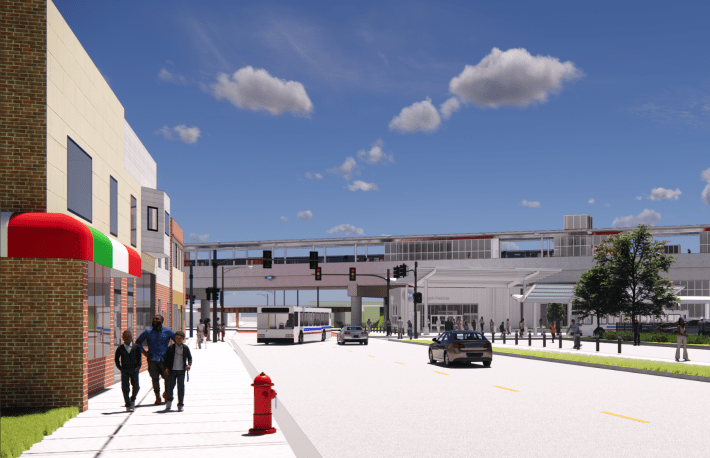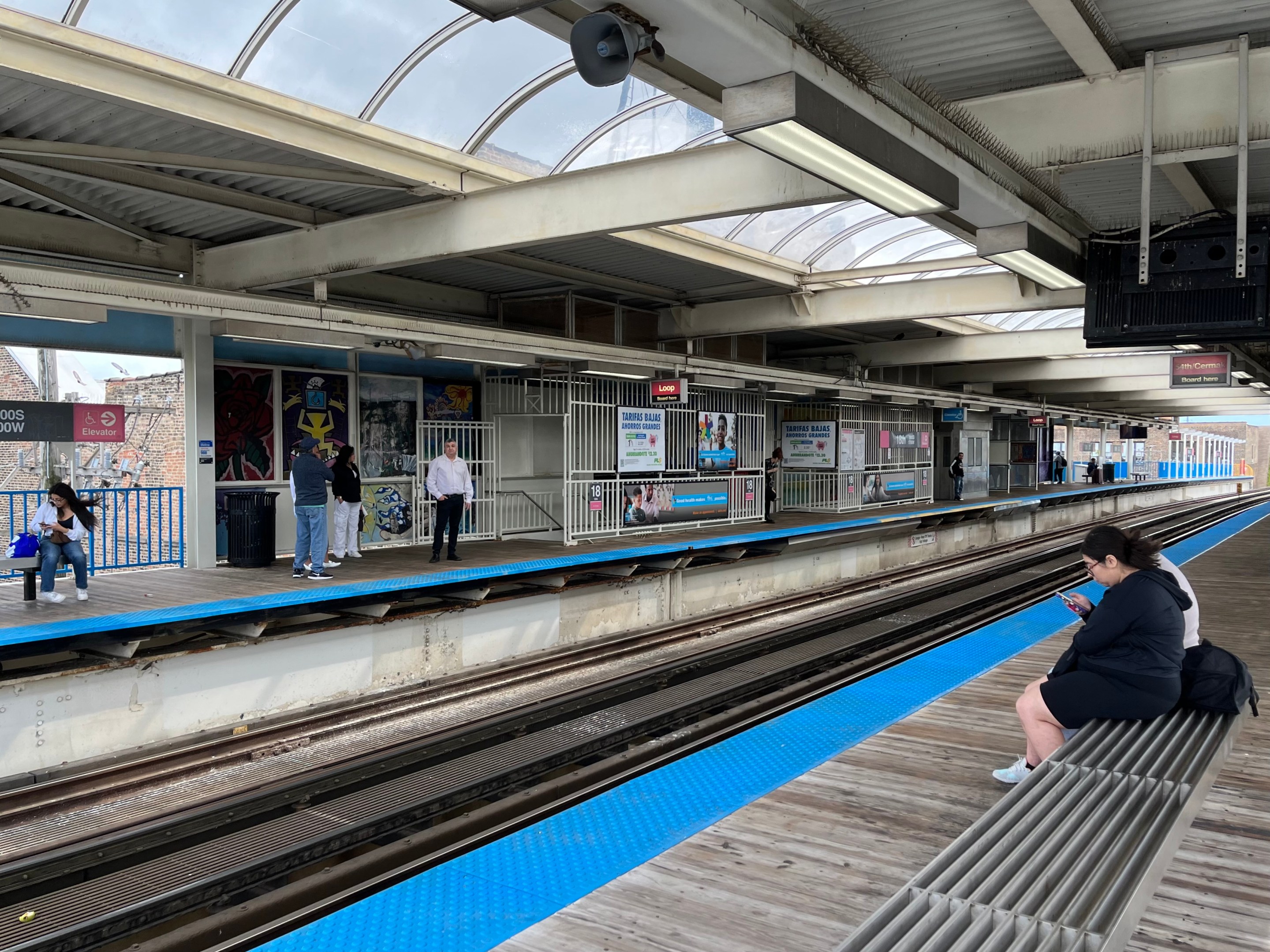CTA service reliability issues and likely funding for the long-awaited Red Line Extension were major topics of discussion at the latest CTA board meeting.
During the public comment period, as has been the case at all the meetings this year, the grassroots advocacy organization Commuters Take Action (CTAction) discussed ongoing service problems throughout the system, especially on the Blue Line. Unsurprisingly, CTA president Dorval Carter Jr., whom the group said should be fired in a recent Tribune op-ed, didn’t directly address those comments. He only acknowledged that service is “not where we want to be,” and acknowledged issues with hiring train operators. He still tried to strike a positive tone, saying that the transit agency was making progress on hiring.
But most of the public comment time was dominated by the discussion of the Red Line Extension to Altgeld Gardens, a public housing development on the southern edge of the city. While the speakers welcomed the announcement that the project was in line for a $1.973 billion federal grant, which allowed CTA to issue a Request for Proposals for a contractor to build the infrastructure, they also wanted to make sure the Far South Side workers and business owners aren’t left out. Transit agency officials said that it is still too early to talk about project-specific hiring plans, but the CTA will try to exceed its regular minority contracting goals.
System delays
CTA’s own Meeting the Moment Scorecard shows that, throughout 2023, the agency only delivered 88 percent of scheduled trips systemwide. That's an improvement compared to last year, when the number never went above 80 percent, but still below the pandemic level. Furthermore, after increasing during the winter, the percentage hasn’t significantly changed this spring and summer. The improvements are more notable on the Blue Line specifically, but even in August, the best month since Meeting the Moment was launched, the number didn’t crack 90 percent.
Morgan Madderom, a Commuters Take Action organizer, reiterated the points that the group has been making at every transit board meeting for the past year. They've said the reliability numbers are deceptive because CTA has simply reduced the number of scheduled trains, and that CTA still struggles to meet even those targets.

“It has been one year since CTA has come out with Meeting the Moment, and the moment has not been met,” she said. “Pre-COVID, the CTA would run 21 trains per hour in rush hour. Now, we're down to eight scheduled trains per hour, but realistically, it may be six or seven.”
Madderom also called out “stagnating” numbers of bus and rail operators, in spite of all the hiring CTA has done in recent months. The transit agency’s Meeting the Moment scoreboard shows the number of bus drivers increasing slightly since February 2023, going from around 3,200 drivers to around 3,400 drivers, but the number of rail operators barely moved within the same period, hovering within 704-722 range.
The hiring dashboard also shows that, while the number of newly hired bus drivers exceeded the number that either left or transferred to other jobs within the CTA, the number of train operators who either left or transferred was much closer to the hiring numbers. In June through August, for example, the CTA saw a net increase of four train operators per month, while March only saw a net increase of one, April saw a net increase of 11 and May saw no net change at all.
“Stagnating operator numbers are a sign that operators are unhappy with their current position,” Madderon said. She pointed to the shortage of available restrooms, especially for bus drivers, a perennial issue for the CTA.
In his report to the transit board, Carter didn’t address the scheduling issues, beyond mentioning that the ridership has been increasing. He did say that “While we continue to have some challenges” hiring train operators, “the transit agency has two cohorts of operators in training, with one of the cohorts expected to be completed in October. We're committed to training as many trail operators as we can." Overall, Carter presented the hiring trends in positive terms, saying that CTA exceeded its hiring goals.
Red Line Extension
On September 8, the Federal Transit Administration announced that the CTA is in line to receive $1.973 billion in federal New Starts grant funding for the long-awaited Red Line Extension to the Far South Side. Combined with the projected $959 million transit tax-increment financing district the Chicago City Council approved for the project last December, plus the federal discretionary funding budget earmarking another $350 million for the project in March, that means the RLE is almost completely funded.
In his recent report, Carter praised FTA’s decision. “I'm excited for the project that will fulfill the unfulfilled promise that was made 50 years ago. With the commitment ffrom the federal government, this project will happen.”

During the meeting, the board signed off on acquisition of several land parcels for the extension, and most of the public comments had to do with the extension. Sylvia Jones, a member of the Red Line Extension Coalition, said she and other Far South Siders “encourage CTA to utilize all available federal and state grants to introduce workforce solutions, climate resiliency and other community benefits for the Red Line project.”
Andrea Reed, the director of the Greater Roseland Chamber of Commerce and a long-time supporter of the extension, said that she wanted to make sure the project creates job opportunities for local youth. "This is something that's near and dear to my heart, and time is of the essence to prepare the young men and women in our community for these opportunities."
Katania Raby, vice president of planning at the Far South Community Development Corporation, noted that the nonprofit has been a long-time supporter of the extension. She said that the RFP can be a great opportunity for Far South Siders
“We're looking forward to seeing local minority businesses taking part in that, and being able to benefit from this amazing addition to their very own community,” Raby said. “As we move forward with this, we encourage the CTA to continue to make sure that the community is prioritized, and we are continuing to be involved in every facet of this planning process and the development of the stations and the tracks and all of this moving forward.”
Shortly after the meeting, JuanPablo Prieto, CTA’s director of diversity programs, told Streetsblog that it was too early to talk about hiring diverse subcontractors and vendors for the extension. But he said that, for all projects, the CTA seeks to give at least 26 percent of the contracts to Disadvantaged Business Enterprises – a federal designation that encompasses women-owned and minority-owned businesses – with a 22 percent minimum specifically for construction contracts. “With [the Red Line Extension], we’re going to follow the model,” Preto said.
Prieto said that CTA would work with organizations such as the aforementioned Greater Roseland Chamber of Commerce. He added that the contractors working on the current Red and Purple Modernization Phase One Project on the North Side will also be able to get work on the Red Line Extension, because the CTA didn’t want the workers' opportunities to be just one job, but a “career.”




